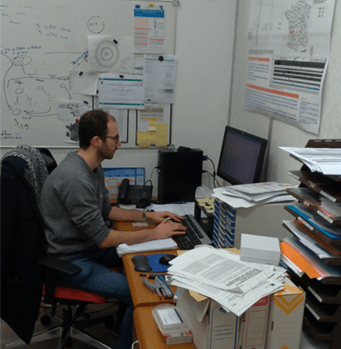Madrid, Comunidad de Madrid, Spain
Carretera de la Ciudad Universitaria, Madrid, Comunidad de Madrid, Spain
Addlestone, England, United Kingdom
147 Rue de l'Université, Paris 7e Arrondissement, Île-de-France, France
14 Rue Pierre et Marie Curie, Paris 5e Arrondissement, Île-de-France, France

The Project #PEMBO
| Start: | October 2019 |
| Duration: | 3 Years |
| Domain: | Emerging Threats |
| Members: | ANSES, INRA- France, APHA- UK, UCM- Spain |
| Contact: | Dr Maria Laura Boschiroli (ANSES) & Dr Franck Biet (INRA) |
PEMbo: From genotype to phenotype: patho-evolution of Mycobacterium bovis French strains
Bovine tuberculosis (bTB), mainly caused by Mycobacterium bovis, is an ancient worldwide zoonotic disease intimately and historically associated to cattle rearing. Although developing countries are most suffering from bTB, this disease remains a major problem in some industrialised countries. When cattle breeding developed as a real industry, strong control strategies were set up first in Europe and then in other developed countries. In France, the introduction of a compulsory national wide control campaign in the sixties led to a relatively rapid decline in the number of infected herds, turning from an annual herd prevalence of about 25% to less than 0.1% in 50 years. These costly measures greatly reduced bTB incidence and offered sanitary guarantees: France obtained the officially bTB free status from the European Union in 2000. However, bTB has not been completely eradicated. Despite considerable financial and social efforts to tackle once for all the disease, bTB seems to be slowly but continuously rising and persisting, mainly at regional levels. This indicates that either control measures are not effective or that there exist overlooked risk factors. Indeed, investigations in these endemic areas revealed that wild boar, badgers and deer were regularly found infected with M. bovis and thus the emergence of the disease at a domestic and wildlife interface.
It is within this framework that the thesis project of A. Hauer, took place. Her work focused on the genotyping of M. bovis strains available at the National Tuberculosis Reference Laboratory (ANSES) in order to obtain the data allowing to study the dynamics of this zoonotic disease and to better understand its complex nature. The genotypes of the complete collection of strains isolated from livestock and wild animals in France between 1978 and 2011 were obtained by conventional genotyping methods: spoligotyping and MLVA. Strains of predominant spoligotype groups SB0120, SB0134, SB0121 and the “F4 family”, were differentiated more finely by MLVA typing which increases the diversity power for molecular epidemiology studies. Approximately 600 genetic profiles were defined from more than 2,000 strains. A decrease in the genetic variability over time and changes in the geographical distribution of strains were observed. They could be explained by changes in breeding practices and by the proliferation of certain dominant genotypes in multi-host systems (domestic-wild animals) in high prevalence regions. In order to deepen our knowledge in the epidemiology of bTB, the complete sequencing of 87 M. bovis strains representative of the genetic diversity in France was carried out. Comparison of these sequencing data with the M. bovis AF2122 reference sequence identified single nucleotide polymorphism (SNP) mutations and allowed to construct a finer phylogeny of these strains. Four of these genomes have been published in international databases. The clonal groups previously described in France by conventional genotyping were confirmed by analysis of SNPs and other less dominant groups were also identified for the first time. This work highlighted the emergence of dominant genotypes and the preponderant role of wildlife and the environment in maintaining infectious foci of bTB.
Subsequent to these studies, which focused on the genotypic diversity of M. bovis strains, and in order to answer the hypothesis of the emergence of certain successful strains circulating in multi-host systems, we propose to study the biology of these strains by genomic and biochemical-phenotypic approaches.
This thesis project was a collaborative study between ANSES, Animal Health Laboratory (Maisons-Alfort) and INRA, Infectiology and Public Health laboratory (Nouzilly), two French EJP Partners. The aim of the project was to better understand the complex biology of M. bovis through the study of the complete genomes of a large panel of isolates of interest. This project was structured in three parts:
- Obtaining reference sequences by Illumina / PacBio sequencing of strains belonging to main clonal groups.
- Identification of genomic events (insertion / deletion or broad sequence polymorphism (LSP)) by comparison study of genetic variation: analysis focused on the study of 182 virulence genes, genes involved in envelope biosynthesis and the study of excreted antigens.
- Study of the antigenic variation: biochemical and lipidomic analyses of the strains.
Project Assets
The PhD was successfully completed in October 2022 by Ciriac Charles.
Read the OHEJP PhD Life blog post by Ciriac.
ANSES Interview 2021 (in French) Paris, France. DOI: https://doi.org/10.5281/zenodo.6581215
ANSES Interview 2021 “Why does bovine tuberculosis persdist in certain regions of France and not in other?” – Portrait of PhD student Ciriac Charles. DOI: https://doi.org/10.5281/zenodo.6581392
Ciriac was awarded 1st public prize and 2nd jury prize at Doc Avenir 2021, Paris, France for his oral presentations. DOI: https://doi.org/10.5281/zenodo.6581466
Charles, C., Michelet, L., Conde, C., Biet, F., Boschiroli, M-L. (2022). Occurrence of IS6110 copies in genomes of field strains of Mycobacterium bovis revealed high disparity among genetic family. Poster presentation at M.bovis conference, Galway, Ireland. 6th June 2022. DOI: https://doi.org/10.5281/zenodo.6581494
Charles, C. (2022). New Mycobacterium bovis complete genomes of different clonal complexes to improve molecular epidemiology studies of French field strains. Oral presentation at ABIES DAYS 2022, Paris, France. DOI: https://doi.org/10.5281/zenodo.6581430
Oral presentation at Labio au Labo 2021 event. DOI: https://doi.org/10.5281/zenodo.6581428
Charles, C., Michelet, L., Conde, C., Biet, F., Boschiroli, M-L. (2021). The insertion sequence IS6110 could play a role in genome plasticity of Mycobacterium bovis strains isolated from French bTB endemic regions. Poster presentation at Journées scientifiques et doctorales de l’ANSES (JSDA), Maisons-Alfort France. 20-28th September 2021. DOI: https://doi.org/10.5281/zenodo.6581509
Charles, C., Michelet, L., Conde, C., Biet, F., Boschiroli, M-L. (2021). The insertion sequence IS6110 could play a role in genome plasticity of Mycobacterium bovis strains isolated from French bovine tuberculosis endemic regions Poster presentation at Microbe 2021, 16th National Congress of the French Society of Microbiology, Montpeiller, France. 20-24th September 2021. DOI: https://doi.org/10.5281/zenodo.6581542
Charles, C., Michelet, L., Conde, C., Biet, F., Boschiroli, M-L. (2021). In silico study of IS6110 sequences abundance and localisation evolution in three main Mycobacterium bovis French genotypes of endemic region. Poster presentation. One Health EJP ASM, Copenhagen Denmark. 9-11th June 2021. DOI: https://doi.org/10.5281/zenodo.6581523
Charles. C. (2021). Occurrence of variable insertion sites and copy numbers of IS6110 in genomes of Mycobacterium bovis. Oral presentation at ABIES DAYS 2021, Paris, France. DOI: https://doi.org/10.5281/zenodo.6581478
Charles, C., Michelet, L., Conde, C., Branger, M., Cochard, T., Biet, F., Boschiroli, M-L. (2020). Occurrence of variable insertion sites and copy numbers of IS6110 in genomes of Mycobacterium bovis field strains reveal high disparity among different genetic families. Poster presentation. One Health EJP ASM, online. 27-29th May 2020. DOI: https://doi.org/10.5281/zenodo.7533866

Ciriac Charles



